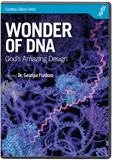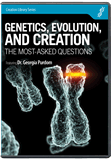Epigenetic Code: Hidden DNA
Epigenetic mutations can produce rapid variation and defy Mendelian genetics.
News Source
Every student learns about Mendelian genetics with autosomal and recessive inheritance. But sometimes what’s in the genes remains hidden. The Salk Institute’s Joseph Ecker notes that since some “patterns of variation and inheritance [do not] match what the genetic sequence says should happen, there is a clearly a component of the ‘genetic’ heritability that is missing.” This “missing” component is called epigenetic because it goes above and beyond what is coded in the actual genes. Ecker’s team has demonstrated a way such variation can happen and even be passed on quite rapidly.
“Our study shows that it’s not all in the genes,” said Ecker. “We found that these plants have an epigenetic code that’s more flexible and influential than we imagined. There is clearly a component of heritability that we don’t fully understand. It’s possible that we humans have a similarly active epigenetic mechanism that controls our biological characteristics and gets passed down to our children.”
Ecker’s team studied methylation, one of the biochemical changes that can happen to the nucleotides that make up DNA. A small carbon-containing functional group can be chemically attached to various spots on the DNA without changing the identity of the genes themselves. Methylation can activate or disable a gene without destroying it.
To be sure all the changes they tracked were due to epigenetic mutations and not ordinary genetic differences, the researchers had to be sure all their subjects were genetically identical.
To be sure all the changes they tracked were due to epigenetic mutations and not ordinary genetic differences, the researchers had to be sure all their subjects were genetically identical. They needed a cooperative clone-able test subject. Hence, they used the proverbial lab rat of botany, the Arabidopsis thaliana plant. All their plants were cloned from a single ancestor.
“You couldn't do this kind of study in humans, because our DNA gets shuffled each generation,” Ecker explained. “Unlike people, some plants are easily cloned, so we can see the epigenetic signature without all the genetic noise.”
The team tracked the changes in methylation as well as the phenotypic results for thirty generations. Of the six million potential sites for methylation in Arabidopsis DNA, a few thousand were altered in each generation. These epigenetic changes occurred five orders of magnitude faster than the ordinary genetic mutation rate. Furthermore, many of these epigenetic changes resulted in changes in gene expression. And those epigenetic changes could be passed on to subsequent generations.
“This means that genes are not destiny,” Ecker said. “If we are anything like these plants, our epigenome may also undergo relatively rapid spontaneous change that could have a powerful influence on our biological traits.”
The next step, of course, is to determine more about how these epigenetic changes actually occur—whether randomly or in response to some environmental conditions. Researchers suspect that epigenetic changes could provide a way to switch a gene on and off as needed to cope with changing environments. Also, it remains to be seen whether similar alterations in genetic expression occur in animals and humans. This mechanism may or may not turn out to be a way our own phenotypic variations occur.
This research, of course, involves no evolution into any sort of new plant. And nothing in the published report makes any claim that this is a mechanism for evolution to occur. Rather, this is a mechanism by which genetic diversity can occur in the absence of mutation and without loss of any genetic information. We can well imagine that Ecker’s team has uncovered one of the ways God designed for the living things He created to diversify as they filled the earth and responded to changing conditions over the years.
Further Reading
For More Information: Get Answers
Remember, if you see a news story that might merit some attention, let us know about it! (Note: if the story originates from the Associated Press, FOX News, MSNBC, the New York Times, or another major national media outlet, we will most likely have already heard about it.) And thanks to all of our readers who have submitted great news tips to us. If you didn’t catch all the latest News to Know, why not take a look to see what you’ve missed?
(Please note that links will take you directly to the source. Answers in Genesis is not responsible for content on the websites to which we refer. For more information, please see our Privacy Policy.)
Recommended Resources

Answers in Genesis is an apologetics ministry, dedicated to helping Christians defend their faith and proclaim the good news of Jesus Christ.
- Customer Service 800.778.3390
- © 2024 Answers in Genesis







